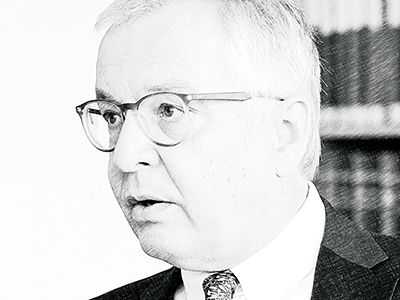Kühnen grapples with Mylan dura vs. Teva damages claim on final day of hearings
On his last day of hearings before retirement, Thomas Kühnen, presiding judge of the patent senate at Düsseldorf's Higher Regional Court, got to grips with the legally complex damages lawsuit between Teva and Mylan dura. However, this was not the first time that the multi-million-dollar dispute over the drug Copaxone has landed on his table.
25 September 2023 by Konstanze Richter
Mylan dura is claiming €15 million in damages from competitor Teva in Germany. The case involves a preliminary injunction enforced for 15 months for a patent that the European Patent Office has since declared invalid. EP 2 949 335 protected the active ingredient glatiramer acetate, which is used in the MS drug Copaxone. The patent was owned by Yeda, which exclusively licensed it to pharmaceutical company Teva.
Doing it Kühnen’s way
In the first instance, the court found in favour of Mylan dura. However, Düsseldorf Regional Court had reduced the claims for damages so the pharmaceutical company, like Teva, appealed the result. As a result, Thomas Kühnen had to deal with the case again on his last day of hearings before retirement.

Thomas Kühnen
Kühnen has been presiding judge of Düsseldorf Higher Regional Court’s 2nd Civil Senate, which specialises in patent cases, since 2008. In 2017, he topped the JUVE ranking as Germany’s best-known patent judge – in fact, lawyers reverently refer to the senate he leads as “the real Federal Court of Justice.”
Even before he took up the important position at Düsseldorf Higher Regional Court, Kühnen worked intensively on patent case law. For seven years before his move to higher court, he headed the renowned patent litigation chamber 4b at Düsseldorf Regional Court.
Copaxone dispute
Since 2017, Mylan dura and Teva have been fighting over patents for the MS drug before various European courts and at the EPO. Teva sold its drug under the name Copaxone, with a dosage of 40 mg/ml. In 2017, Mylan launched its generic product Clift with the same dosage in the US and Europe.
Teva saw Clift as an infringement of EP 335 and applied for a preliminary injunction against Mylan in Munich. However, both the first and second instance rejected a PI due to doubts about validity.
After an EPO opposition division upheld the patent, Teva again applied for a preliminary injunction at the Regional Court Düsseldorf. In June 2019, the first instance issued a sales ban for Clift in Germany.
From Mylan to Viatris

Christoph de Coster
Teva then enforced the PI, with Mylan appealing the decision in return. In September 2019, the Higher Regional Court’s 2nd Senate – meaning Thomas Kühnen himself – upheld the first-instance decision.
The Boards of Appeal, however, destroyed the patent in parallel opposition proceedings in September 2020, immediately after which Mylan sued Teva for damages for lost income due to the sales ban.
The dispute between the two pharmaceutical companies is complex, in part because Mylan dura restructured under the ‘Viatris’ umbrella during the phase in which Teva enforced the PI.
The key question in the proceedings is therefore whether, and how, this restructuring affects the damages claim.
No negligence at play
The question of fault is also at issue. Is Teva liable for having executed the PI even though the legal status of the patent was still under review by the EPO Boards of Appeal? It is true that a patent holder that enforces a judgment bears a certain risk, so long as the fate of an IP right has not yet been clearly established, said Kühnen. However, he said, this is not negligent. In addition, Mylan also has a duty to keep the enforcement damage as low as possible by taking appropriate measures.

Oliver Jüngst
On the other hand, Mylan’s representatives argued that Teva had vigorously enforced the judgment from the beginning and only ended this with the final revocation decision of the Boards of Appeal.
This, they argued, did not allow Mylan to limit the damage through further appeals.
Risking infringement
Teva’s representatives countered that Mylan had entered the German market with its product in 2017, although an EPO opposition division had already confirmed the patent’s validity at that time. As a result, Mylan had taken the risk of patent infringement.
Thomas Kühnen announced a ruling in the dispute for 12 October. As in previous proceedings, the parties relied on their long-standing representatives. (Co-author: Christina Schulze)
For Mylan dura
Taylor Wessing (Munich): Christoph de Coster, Jan Rektorschek, Julius Zacharias (all partners)
In-house (London): Jennifer Sunderland (senior patent litigation counsel)
For Teva
Bird & Bird (Düsseldorf): Oliver Jüngst (partner), Moritz Schroeder (counsel)
Higher Regional Court Düsseldorf, 2nd Civil Senate
Thomas Kühnen (presiding judge)
Update 13.10.2023: Yesterday, the Higher Regional Court Düsseldorf published its decision in the damages case (case ID: I-2 U 124/22). The court awarded Mylan damages of almost €3.3 million plus interest. The amount results from the lost profits due to the injunction, as well as the destruction of the goods.
This is less than the figure set by the Regional Court Düsseldorf in the first instance, which was close to €5.2 million plus interest.
The judges also ordered Teva to compensate Mylan for any further damage it has incurred and will incur in the future in Germany from October 2020 onwards, i.e. after the patent was destroyed by the EPO, as a result of the enforcement of the preliminary injunction.
However, Kühnen and his fellow judges did not recognise the damages claimed for a sister company of Mylan.
At the same time, the court granted Mylan a claim to the profit Teva has made since mid-2019 as a result of enforcing the preliminary injunction, to the extent that this exceeds the damages awarded. To this end, the Higher Regional Court also ordered Teva to provide information.
An appeal to the Federal Court of Justice was allowed.
JUVE Patent updated this article on 13.10.2023 to reflect the latest developments.